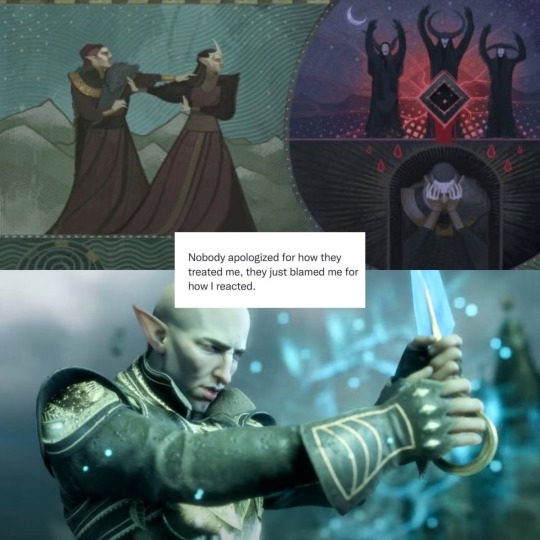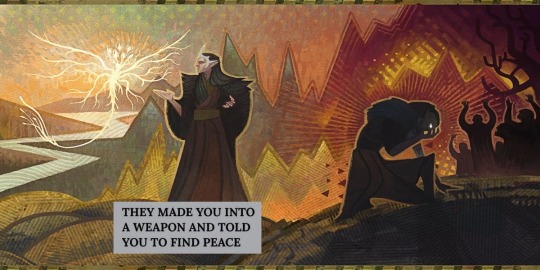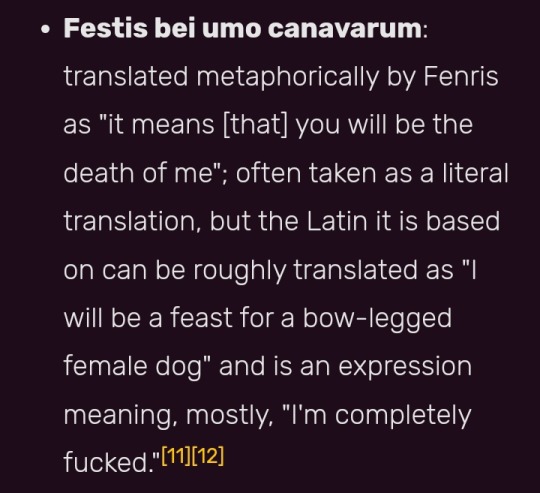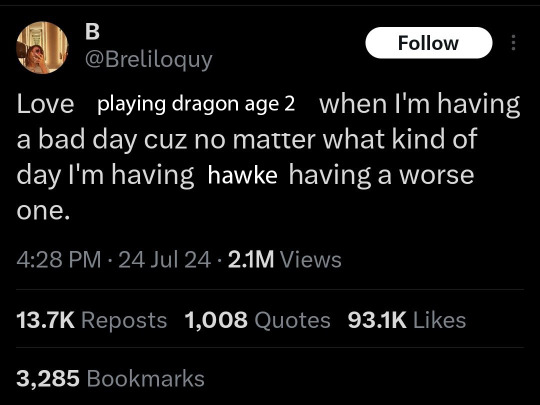The second game was the best one, you cannot change my mind. Follows will come from pepperpatrol.
Don't wanna be here? Send us removal request.
Text
i can't find that one really good post about the differences in fenris' hatred for anders (dismissive) vs merrill (pure vitriol) and how it relates to his idolization of family ties, but once you see it it's hard to ignore



forget slavers, blue wraith should have had him hunting down deadbeat dads or something
88 notes
·
View notes
Text
Solas and Veilfall; Not a Hero, Not a Selfish Monster
pls do not include character/ship/game hate on this post, ty! <3
Let's start with a clarification: I am delighted with the direction DAVG went. Truly. I think that keeping the veil up the way they did was brilliant. I've written about my positive feelings elsewhere so I won't reiterate them here, but suffice to say I'm in favor of Veilguard’s direction.
Now. Solas.
He's not innocent, not flawless or blameless. Nor is he removing the veil entirely due to his own guilt and regret. That's a factor, but not the sole factor, and arguably not the most important one.
The prison was failing. Either time (and potentially the efforts of the Evanuris over the centuries) were weakening it and it would eventually fail, releasing the remaining Evanuris onto a world wholly unprepared, or it would break after the last Evanuris had died as a result of their dragon thrall being killed.
In either scenario, I think it would also notably release the blight. All of the blight. I will admit, this part is fuzzier, but since the Evanuris are clearly making use of the blight in ancient Arlathan, I suspect the prison–which was designed and intentional–also served as the repository for the blight, very possibly kept separate from the Evanuris. A locked box in the center of the prison, that kind of thing. But if that's the case, then the Evanuris' lives would be tied to that which sealed the blight.
Now, I'll say here that I may be wrong about the blight. It may be that the blight is sealed elsewhere, perhaps in the Black City, which may be separate from the prison. But Solas–who is, admittedly, far from a perfect source of information–says that the prison was failing. Solas does lie, but he prefers to tell truths with a tactical care, ones that advance his agenda. But what I find most convincing is the final mural, the extension of the last scene in DAI (the base game, not the DLC). Flemythal says something to the effect of yes, the prison needs to be dealt with.
It could all be fake, could be mirrors upon mirrors, but at some point I find that very hard to deal with. Does Solas lie? Yes. Could he be lying here? Yes. Does the narrative of Veilguard usually let us know when he's lying, not immediately but down the line a bit? I'd say yes. Does the narrative ever imply this was a lie? No. If I doubt everything it's very hard to analyze and engage with, so I'm going to assume there's truth to Solas' fears here.
But (Mythal voice) let's set aside the blight for now. We know that the prison is tied to the veil; we know that the Evanuris are dying out as their dragon thralls are killed by Grey Wardens; and we know that the prison–and thus, the veil–is tied to the lives of the Evanuris. So if nothing else, the Evanuris dying indirectly at the hands of the Grey Wardens would see the prison destroyed, and the veil. The final blight would be defeated, and the veil would be destroyed in a cataclysmic way, judging by how it was erected.
So, back to Solas. Solas wants to tear down the veil. He has three primary reasons: restoration; regret; and preservation. He is willing to do something that will lead to death, even mass death, but it is not exclusively to soothe his own hurt feelings. While those feelings are a core part of him and drive him, I find it a little maddening to have the veil as a ticking time bomb conveniently ignored to cast him in the role of monster. He is willing to cause a great deal of death to prevent everyone and the world dying. He is trying to minimize the death caused by something he sees as an inevitability. No good choices, indeed.
His greatest mistake is in attempting this alone. That's a major underlying message in Veilguard, and in the prior games; that the world is not saved by an individual, but by many people working together. The veil was going to come down at some point. And if Solas ignored it, or if Solas went back into uthenera, or if he died, the only one who would know anything about it is Mythal, and while I find her eminently capable (and love her. I love her so much), it's unclear if she knows the particular mechanics of it. It's also possible that Solas, being the one who made the prison, would be the one best suited to bring it down; not due to skill or power, but due to the resonance of the magic being the same.
So he really can't just shrug and say the veil is fine. However! It is possible that this could have been avoided by him binding himself to the veil early on. I think this is what Flemythal was driving at in that mural; the Evanuris needed to be kept imprisoned, but the veil did not need to come down. But it needed to be dealt with somehow. Solas' original choice was not the only choice that could be made, and that's where his desire to soothe his regrets and restore that which he took from his people come heavily into play.
In an entirely practical way, it might also have been hard for him to convince himself that binding himself to the veil was a viable option. He was risking death with the Inquisition and will likely continue to risk death moving forward, and he knows the cost of the sole holder of the veil dying. Which is why I suspect that he will continue to search for a way to bring it down, but now with the relative luxury of time and not needing to worry about the imprisoned Evanuris.
There are still no good options, but in the end (in the redemption ending) he chooses to take on the responsibility directly and literally. It's far from a perfect solution, but it's the solution he chose, and perfection is rarely narratively satisfying.
18 notes
·
View notes
Text
Inquisition's "Bad Future" and its Relationship to Solas' POV
please do not add hate to this post, bring up the art book, or bring up the books/comics. thank you!
if you decide to recruit the mages to help seal the breach, then the inquisitor and dorian will be plunged into a "bad future", going forward a year
there is no way to proceed without "resetting" the timeline, without putting it back to the moment that they were flung into the future. but during the bad future, leliana says - accurately - that while dorian and the inquisitor see this almost as a bad dream, a thing to be undone, that it was real. their hurt was real. their joy was real. they existed in that year
and we as players are made complicit in erasing the entirety of that existence
this puts us in solas' position! this shows us his fundamental perspective!
he woke a year before the events of inquisiton, to a world that he, too, felt needed to be "reset". like the inquisitor and dorian, he saw the current state of the world as an intolerable deviation from what should be, and was willing to sacrifice people - as the inquisitor and dorian did - in order to put it back on the right path
granted, the world was in great peril in this bad future. the inquisition itself was destroyed. maybe many of those in southern ferelden would have welcomed the chance to have this all "undone"...
but what of those beyond? somewhere, a child was born in that year, and then erased. not killed, to be remembered, but fully erased from the course of history, made into something that never existed. somewhere in the world, someone did something that meant a great deal to them or to others in that year: again, that action was erased. they cannot be remembered, it cannot be remembered, it is gone
so, did the world need to be reset? i mean... that was probably the safest bet, if you want the world itself/the cultures as a whole/the people as a whole to have the best chance of survival
which, again, is kinda solas' thing. he's not out here just mercilessly killing for its own sake. he openly resents having to kill anybody, even enemies, although resenting it has certainly not stayed his hand
solas thought it would be necessary, which is something i've talked about before:
Solas and Veilfall: Why it Was Necessary... Until it Wasn't
Solas and Veilfall; Not a Hero, Not a Selfish Monster
"People are always dying. It is what they do." (contains an analysis of this bad future timeline as well!)
and what he was doing was necessary - perhaps not all of it (was tearing down the veil necessary or desired? it's unclear!) - but certainly dealing with the evanuris was necessary. even flemythal, who discouraged him from tearing down the veil, admitted that dealing with the "gods" was a necessary action. even the veilguard believe that what solas did in the time of arlathan was just and right
in the bad magic future, we are solas. we are waking to a world rendered horrible, a miserable experience compared to that which we knew. but, really, what all do we see? redcliffe castle. we hear about more, but it's just hearsay. in-game, it clearly doesn't take more than a day to erase that year in its entirety
what if the corruption was contained? what if there was an effort being mounted against it, one which might have been successful? what if all that remained of ferelden and orlais had joined forces? what if the dwarves had regained their ancestral magic somehow? what if spirits freely interacted with the world outside of this area of prime corruption?
hell, put all that aside: what if the corruption was false? what if everything we experience in that bad future was the work of a demon, or of alexius himself? what if having the inquisitor and dorian "undo" what he had done was his final effort to save felix? what if he created a horrific showpiece that presented a nightmare as reality and forced them to change it back?
is any of that likely? probably not! but the thing is: the inquisitor and dorian do not and cannot know
just as solas did not and could not know... in the beginning!
had his initial plan succeeded, he would have been as willing as the inquisitor and dorian to take that step. as confident that, even with the costs, it was right, it was just, it was necessary
i'm pretty sure more people do the mage route than the templar route. but whatever the analytics may say, certainly many people have done the mage route and have played through this entire narrative, up to and including erasing it and then continuing on with the game
and, narratively, it prepares us for solas' announcement. and it draws a comparison between the inquisitor and dorian and solas himself
and the thing is... the inquisitor and dorian remember that. as two individuals opposed to solas in some manner in canon, they also have to carry forward the knowledge that, in somewhat similar circumstances, they made the choice that solas tried to make. it is entirely likely that they bury this awareness, that they cover it, that they try to forget... but their actions remain, and the unknown cost remains, even though it has been erased
19 notes
·
View notes
Text

By askbroodyelf, who Tumblr isn't letting me tag
20 notes
·
View notes
Text








As a survivor of a narcissistic and emotionally immature parent, I will never get over what Mythal did to my sweet angel boy.
#I do not think that Solas is a sweet angel boy#nor do I think that Mythal is anything but an allegory for privilege#But I do feel like the image set captures the dynamic well!
620 notes
·
View notes
Photo

couldnt sleep - 3am to 6am project. used this pic as reference (eyeballed for the sketchn droptooled for colors, droptooled for colors for fenris from a screencap from the game). closeup of his face bc im very happy with how it turned out:

12K notes
·
View notes
Text




A throwback from the time I cosplayed Isabela from Dragon Age 2 (Concept art).
I LOVED wearing this costume. It was made by Atsukine, and the pics were taken by my talented friend Keyran Halo (IG)
My slutty pirate queen deserves the best <3
57 notes
·
View notes
Text

fenris literally said "i'm completely fucked❤️" and then decided to translate it in the most romantic way possible.
3K notes
·
View notes
Text
Was thinking about how much I love how important the writers made Davrin within the story, but also within the in-universe history of Thedas.
He is the guardian of the only remaining griffons; he killed an Archdemon; he helped to end a double Blight, and consequently prevent any more Blights from occurring (as far as we understand wrt the lore). I think that he is the most important Warden in contemporary Thedas (yes, including The Warden).
Also love the in-universe historical parallels between him and Garahel. A elven Warden, bonded with a griffon, who killed an Archdemon, ended a Blight, and became a legendary hero + face of the Order. I expect that his name would become at least as revered as Garahel's, throughout the continent.
I love that they decided to draw that parallel, and I love how deliberately they chose to position him in the narrative.
430 notes
·
View notes
Text
at a certain point not bringing up fiona clearly being under blood magic throughout in hushed whispers nearly loops around to being funny.
29 notes
·
View notes
Text


the Advisors
(just trying out the designs for fun based off this page in the official art book 🙂)
896 notes
·
View notes
Text

“unbothered. moisturized. happy. in my lane. focused. flourishing.”
-Cassandra reading her smutty literature on the beach (don’t tell Varric)
1K notes
·
View notes
Text
ghrhghhhhh i know this is hardly a revolutionary opinion but varric and hawke's friendship is just literally so beautiful. the entire game only exists because varric is clearing your name and sharing your story and reminding the people who see you as just the Champion of Kirkwall that you are a person and people loved you. the kirkwall crew in general makes me so emotional just by way of gaining loyalty through RIVALRY. like you can argue with them or you can encourage them it doesn't matter because You're Still There. the fact that you stick up for fenris even as he spits in your face. that you fight for isabela even after she betrays you. that you stay by merrill's side even as she pushes you away.
and that's the story varric is telling. no, hawke didn't save the city. they didn't save the viscount. they didn't save their family. they didn't save the mages. they didn't save the grand cleric. they didn't even save themself. but here are five-six people they did save. people you don't even know and probably don't even care about but they exist. they matter. and hawke was the only person in the world that cared enough to stand at their side even through all their flaws and mistakes and imperfections. and they were better people for knowing them, and their lives were better for hawke having lived in it.
hawke mattered. not the champion of kirkwall. hawke mattered.
129 notes
·
View notes
Text
So like the soul thing is weird bc you know that Souls *exist* and dwarves have souls bc of everything you listed above right? But I think they're supposed to be souls from different sources. Humans/Elves are getting theirs from the fact that they used to be Spirits from the Fade while Dwarves are getting theirs from their connection to the Titans??? Maybe?
But like, I get this conclusion based on vibes entirely. No one outright states any of it but it's implied that Fade magic and Titan magic is different bc if Rook is a mage they say Harding's magic feels different from theirs. But then Titan *blood* lets spirits become physical while keeping their connection to the Fade. So Titans at least had some kind of connection to the Fade and the dwarves were probably getting that through them. Solas's Big Angst about becoming physical implies that there *is* something different about making that leap even in a world where the Fade isn't separated from the physical world. So a Spirit is not a Soul bc it has to change? to become one? Maybe that's why abominations used to also physically morph people? Esp since we've got the implication that there is Becoming Physical *without* lyrium (no magic) and Becoming Physical WITH lyrium (magic) or possessing a mage and becoming something else entirely(but still magic). There's also being a Titan, which seems to be the bridge between physical and metaphysical (through blood...).
I think Cole's mission and the implication that magic is dying out as a trait of the Dalish implies that the more physical, or the longer that something is physical, the more of the metaphysical that it looses. Hence, my hypothesis that the thing about Blood magic is that it's making you more present in your physicality by casting with your body rather than your metaphysical soul stuff and that is what's slowly drifting a blood mage away from the fade (without a demonic benefactor? I imagine the presence of a demon would make that drift slower or more difficult).
I do think the Titan bit was planned from the beginning bc there was enough evidence through Codex entires and whatnot by DA2 for people to begin speculating about Titans. I just don't think they had the details worked out bc the current details make Red Lyrium a weird phenomenon.
(On a sidenote, the human mage thing. I have been reconciling the idea to myself by remembering two things: They made the odd decision to say human/elf unions always have human children. The reason the Da Vinci Code plot is stupid is bc after a handful of generations everyone is distantly related bc of bottlenecking from things like natural disasters. If Jesus was a real guy who had kids literally everyone on earth would be related to him genetically. Given the time between the fall of Arlathan and now it's not unreasonable to say that somewhere along the line everybody's got at least one elvhen ancestor.)
(This could also imply that maybe part of the mage supremacy of the early days is simply bc there used to be more mages than there are now.)
(There is also the possibility that humans, like Qunari, don't even come from the continent of Thedas at all. There's also weird shit about Dragons And Magic that muddle up this Physical vs Metaphysical theory as well.)
(I don't know. I am also just streaming my thoughts here.)
i cant remember if i ever actually reblogged the post in which i wrote this out in the tags or if my app crashed, but my way of reconciling the fact that prior to inquisition even blood mages acted as if blood magic inherently opened you up to demons while solas claimed it cut you off from the fade (and i do not believe he was lying here—he rarely did so directly in inquisition) is that it does cut you off from the fade, just... slowly, but the pain inherent to, say, cutting yourself open for fuel, thins the veil!
so a relatively new or sparing blood mage is at greater risk while someone who's been a consistent user of blood magic for long enough is actually less of a risk!
as a potential example see uldred (lost control of a blood magic binding spell and got possessed) vs avernus (lost control of a blood magic binding spell and was like. fine). technically we don't know exactly how long or often either of them were practicing blood magic beforehand, but i doubt uldred could've done anything too openly or consistently other than teaching apprentices while avernus certainly doesn't seem to be treated as inexperienced in that regard in what we see of him in the flashbacks.
it also acts as a fun parallel with lyrium which is also both used for 'anti-magic' purposes and as a power source imo
28 notes
·
View notes



